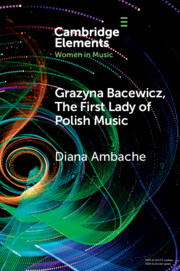Element contents
Grazyna Bacewicz, The 'First Lady of Polish Music'
Published online by Cambridge University Press: 01 August 2022
Summary
- Type
- Element
- Information
- Series: Elements in Women in MusicOnline ISBN: 9781108913485Publisher: Cambridge University PressPrint publication: 18 August 2022

